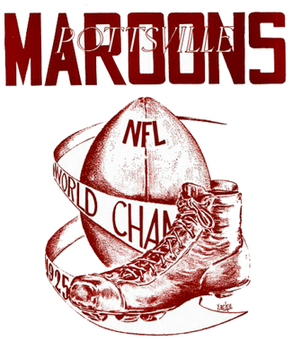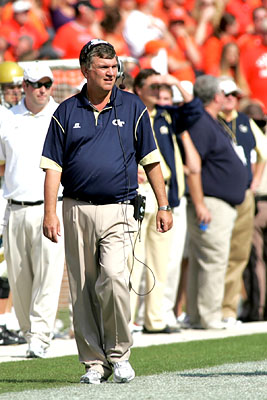Related Research Articles

The Frankford Yellow Jackets were a professional American football team, part of the National Football League from 1924 to 1931, although its origin dates back to as early as 1899 with the Frankford Athletic Association. The Yellow Jackets won the NFL championship in 1926. The team played its home games from 1923 in Frankford Stadium in Frankford, a section in the northeastern part of Philadelphia, noted for the subway-elevated transit line that terminates there.

The Providence Steam Rollers were a professional American football team based in Providence, Rhode Island in the National Football League (NFL) from 1925 to 1931. Providence was the first New England team to win an NFL championship. The Steam Roller won the league's championship in 1928, which is the latest NFL championship win by a defunct team to date. Most of their home games were played in a 10,000-seat stadium that was built for bicycle races called the Cycledrome.
Buffalo, New York had a turbulent, early-era National Football League team that operated under multiple names and several different owners between the 1910s and 1920s. The early NFL-era franchise was variously called the Buffalo All-Stars from 1915 to 1917, Buffalo Niagaras in 1918, the Buffalo Prospects in 1919, Buffalo All-Americans from 1920 to 1923, Buffalo Bisons from 1924 to 1925 and in 1927 and 1929, and the Buffalo Rangers in 1926. The franchise, which was experiencing financial problems in 1928, did not participate in league play that season.

The Pottsville Maroons were an American football team based in Pottsville, Pennsylvania, in the northeastern part of the state. Founded in 1920, they played in the National Football League (NFL) from 1925 to 1928. In 1929 they relocated to Boston, where they played one season as the Boston Bulldogs.
The Orange Tornadoes and Newark Tornadoes were two manifestations of a long-lived professional American football franchise that existed in some form from 1887 to 1941 and from 1958 to 1970, having played in the American Amateur Football Union from 1888 to 1895, the National Football League from 1929 to 1930, the American Association from 1936 to 1941, the Atlantic Coast Football League from 1963 to 1964 and 1970, and the Continental Football League from 1965 to 1969. The team was based for most of its history in Orange, New Jersey, with many of its later years in Newark. Its last five seasons of existence were as the Orlando Panthers, when the team was based in Orlando, Florida. The NFL franchise was sold back to the league in October 1930. The team had four head coaches in its two years in the NFL – Jack Depler in Orange, and Jack Fish, Al McGall and Andy Salata in Newark.

The Vancouver Giants are a major junior ice hockey team playing in the Western Hockey League (WHL). Inaugurated in 2001–02, the Giants have won one President's Cup in 2006 and one Memorial Cup in 2007 in their 16-season history. Their home rink was the Pacific Coliseum in Vancouver, British Columbia, an arena previously used by the National Hockey League (NHL)'s Vancouver Canucks. Effective with the 2016–17 season, the team relocated to the Langley Events Centre in the Township of Langley, a suburb of Vancouver.
The 1923 NFL season was the fourth regular season of the National Football League. For the first time, all of the clubs that were considered to be part of the NFL fielded teams. The new teams that entered the league were the Duluth Kelleys, the St. Louis All Stars, and a new Cleveland Indians team, while the Evansville Crimson Giants dropped out of the league and folded. The Canton Bulldogs repeated as NFL Champions after ending the season with an 11–0–1 record.
The 1924 NFL season was the fifth regular season of the National Football League. The league had 18 teams play during the season, including the new clubs Frankford Yellow Jackets, Kansas City Blues, and Kenosha Maroons. The Louisville Brecks, Oorang Indians, St. Louis All Stars and Toledo Maroons folded.
The 1930 NFL season was the 11th regular season of the National Football League.

Paul Clayton Johnson is a retired American football coach. He served as the head football coach at Georgia Southern University from 1997 to 2001, the United States Naval Academy from 2002 to 2007, and Georgia Tech, from 2008 to 2018, compiling a career college football coaching record of 189–100. Johnson's Georgia Southern Eagles won consecutive NCAA Division I-AA Football Championships in 1999 and 2000. He is noted for his use of the flexbone spread option offense.
Pittsburgh Yellow Jackets was the name of three separate ice hockey teams based in Pittsburgh, Pennsylvania. The original team was part of the United States Amateur Hockey Association (USAHA) from 1920 to 1925 and developed from predecessors dating back to 1915. After winning the USAHA Championship in 1924 and 1925, the ostensibly amateur Yellow Jackets turned fully professional and became the Pittsburgh Pirates of the National Hockey League. After the Pirates relocated in 1930 to play as the Philadelphia Quakers, a second Pittsburgh Yellow Jackets club played for two seasons in the International Hockey League, a minor professional circuit. A third Yellow Jackets team was organized at the amateur level in 1935 by John H. Harris and competed in the Eastern Amateur Hockey League before folding in 1937.
The 1923–24 Ottawa Senators season was the club's 39th season of play and seventh season in the NHL. Coming off a Stanley Cup Championship in 1923, they had won three cups in the previous four seasons. The Senators moved into the brand new Ottawa Auditorium prior to the season. The club had an outstanding regular season, but lost in the NHL playoffs to the Montreal Canadiens.
The Anthracite League, also referred to as the Anthracite Association, was a short-lived American football minor league comprising teams based in coal-mining towns in eastern Pennsylvania. The league lasted for just one season before folding. The teams in the league were the Coaldale Big Green, Wilkes-Barre Barons, Shenandoah Yellow Jackets, Gilberton Cadamounts, and Pottsville Maroons.
Carl Linnwood Beck was a professional football player from Harrisburg, Pennsylvania. After attending high school, Beck attended the West Virginia University, Bucknell University and Lafayette College. He made his professional debut in the National Football League in 1921 with the Buffalo All-Americans. He played for the All-Americans for 1 year, before leaving the NFL. He later returned to the NFL in 1925 as star with both the Pottsville Maroons and the Frankford Yellow Jackets. To date, he is considered by sports writers to be one of the greatest running backs ever developed in Pennsylvania. When not playing football, Beck worked as a police officer for the Harrisburg Bureau of Police.
The 1925 Rochester Jeffersons season was their sixth and final season in the National Football League. The team improved on their previous record against league opponents of 0–7, losing only six games and logging a tie. They tied for sixteenth in the league.
The 1924–25 season was the 44th in the history of Nelson Football Club, and their fourth as a professional team in the Football League. The campaign saw the team return to the Third Division North, having finished in the relegation zone of the Second Division in 1923–24. Despite losing only one match all season at Seedhill, Nelson's home ground, the team struggled in away matches. Nelson ended the campaign on 53 points, with a record of 23 wins, 7 draws and 12 losses, and finished as runners-up to Darlington in the league table. Nelson reached the Sixth Qualifying Round of the FA Cup, beating non-League Winsford United before being knocked out of the competition by Coventry City. The team progressed past the first round of the Lancashire Senior Cup with a win against Wigan Borough, but were defeated in the following round by Blackburn Rovers.
Henry Marvin "Heinie" Benkert was a professional American football running back who starred collegiately at Rutgers University, where he won the unofficial collegiate scoring crown as a senior, and played for four non-consecutive seasons in the National Football League, for the New York Giants, the Pottsville Maroons and the Orange/Newark Tornadoes.

The 2017 Georgia Tech Yellow Jackets football team represented the Georgia Institute of Technology during the 2017 NCAA Division I FBS football season. The Yellow Jackets were led by tenth-year head coach Paul Johnson and played their home games at Bobby Dodd Stadium. They competed as a member of the Coastal Division in the Atlantic Coast Conference. They finished the season 5–6, 4–4 in ACC play to finish in third place in the Coastal Division.
The 1923–24 season was the 29th season of competitive football by Southampton, and the club's second in the Second Division of the Football League. Having finished in a mid-table position the previous season, the club made progress towards their goal of promotion to the First Division by finishing fifth in the second flight in 1923–24. The campaign started off relatively poorly, as the club won just two of their opening ten fixtures and found themselves around the middle of the table again. However, the team's performances began to improve, and by the middle of January they had made it to the top five in the division. With tough competition at the higher end of the Second Division, Southampton continued to drop points in key matches and finished the season in fifth place with 17 wins, 14 draws and 11 losses.

John Peter Roepke was an American football halfback who played one season in the National Football League (NFL) for the Frankford Yellow Jackets as well as four seasons in minor leagues with the Atlantic City Tornadoes, Clifton Heights Orange & Black, Upper Darby Greenbacks, and Paterson Night Hawks. A native of New Jersey, he attended Penn State University, playing football, baseball, and basketball before graduating in 1928. He was selected to the College Football All-America Team following his senior season of 1927. Roepke also briefly played professional baseball for the Scranton Miners in 1928.